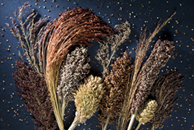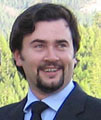


Scientists at the Joint Genome Institute and several partner institutions have published the sequence and analysis of the complete genome of sorghum, a major food and fodder plant with high potential as a bioenergy crop. The genome data will aid scientists in optimizing sorghum and other crops not only for food and fodder use, but also for biofuels production. The comparative analysis of the sorghum genome appears in the Jan. 29 edition of Nature. More>
![]() Scientists in the Quantum Materials program have discovered domain walls that conduct electricity, a phenomenon never seen before. Mere billionths of a meter wide, conducting domain walls could be the ultimate nanoscale feature for future electronics. The researchers not only found the novel features but have learned how to write, erase, and manipulate them. More>
Scientists in the Quantum Materials program have discovered domain walls that conduct electricity, a phenomenon never seen before. Mere billionths of a meter wide, conducting domain walls could be the ultimate nanoscale feature for future electronics. The researchers not only found the novel features but have learned how to write, erase, and manipulate them. More>
 Joshua Bloom, a guest in Berkeley Lab’s Physics Division, was recognized by the American Astronomical Society “for distinction in astronomy and astrophysics.” Bloom received the Newton Lacey Pierce Prize for his work to explore and understand the nature of gamma-ray burst sources, both as a successful observer of these enigmatic and highly transient phenomena, and through his work to synthesize these observations into a coherent model of the mechanisms and astrophysical sites of gamma-ray burst formation. Go here for more on Bloom’s research, and here for a complete list of American Astronomical Society awardees.
Joshua Bloom, a guest in Berkeley Lab’s Physics Division, was recognized by the American Astronomical Society “for distinction in astronomy and astrophysics.” Bloom received the Newton Lacey Pierce Prize for his work to explore and understand the nature of gamma-ray burst sources, both as a successful observer of these enigmatic and highly transient phenomena, and through his work to synthesize these observations into a coherent model of the mechanisms and astrophysical sites of gamma-ray burst formation. Go here for more on Bloom’s research, and here for a complete list of American Astronomical Society awardees.
 Video: Secretary of Energy Chu’s All-Hands Address Now Available
Video: Secretary of Energy Chu’s All-Hands Address Now AvailableThe talk by former Berkeley Lab Director and newly appointed Secretary of Energy Steve Chu that was presented to all DOE staff last week is now available online. In the address, Chu discusses the future direction of the agency and its focus on improving economic prosperity, energy security, and the environment. Chu said the DOE is uniquely position to address these challenges, calling it “an incredible opportunity, and one we cannot fail.” Video>
 World of Science: Solar Cells to Lessen the Load on the Front Lines
World of Science: Solar Cells to Lessen the Load on the Front LinesU.S. soldiers on patrol in remote locales are often outfitted in the latest high-tech gadgetry, devices that enhance mission capabilities and help keep the infantry safe. Powering all this equipment, however, requires the soldiers to carry up to 20 pounds of batteries for recharging. The National Renewable Energy Laboratory is teaming with a consortium to perfect an advanced solar cell panel that would be tiny enough to be built into differing types of portable electronic equipment, like night vision goggles (pictured), yet powerful enough to deliver a sufficient current for charging. More>
Berkeley Lab is beginning the formal review and employee comment period for the proposed consolidation of its Postdoctoral Fellow policies in Regulations and Procedures Manual (RPM) Section) 2.28. The purpose of the Postdoctoral Fellows policy is to enhance a postdoctoral fellow employee’s work experience by providing performance feedback, and detailing the supervisor’s role in managing a postdoctoral fellow employee, which includes providing guidance, coaching, and mentorship. The policy also addresses recruitment and the length of a postdoctoral fellow appointment. This policy applies to non-represented postdoctoral fellow employees only. Represented employees should contact their union representative or consult their collective bargaining agreement. To comment on this proposed change, contact [email protected] by Feb. 21.